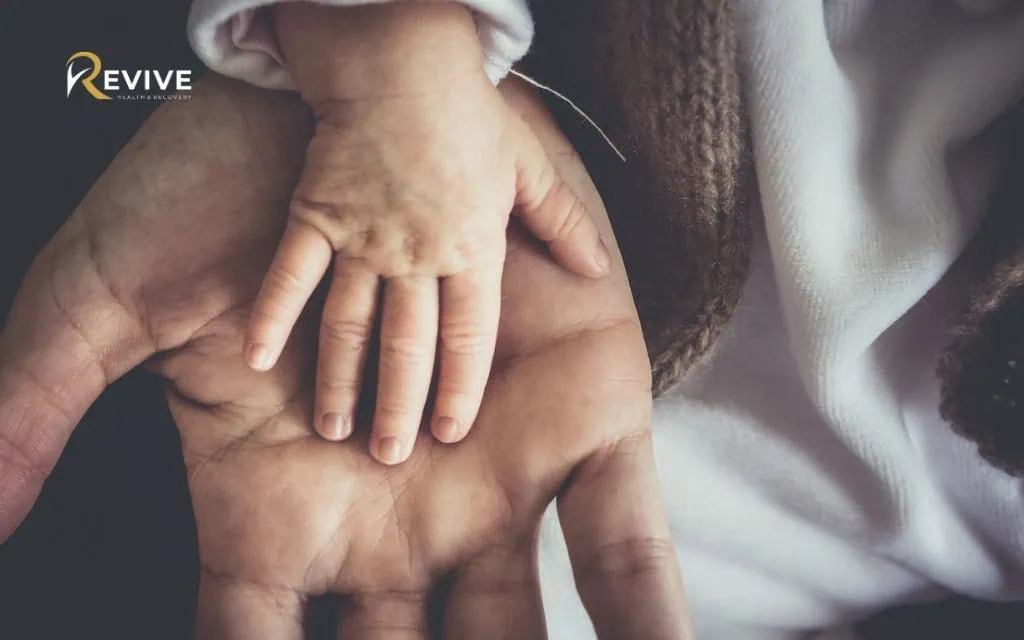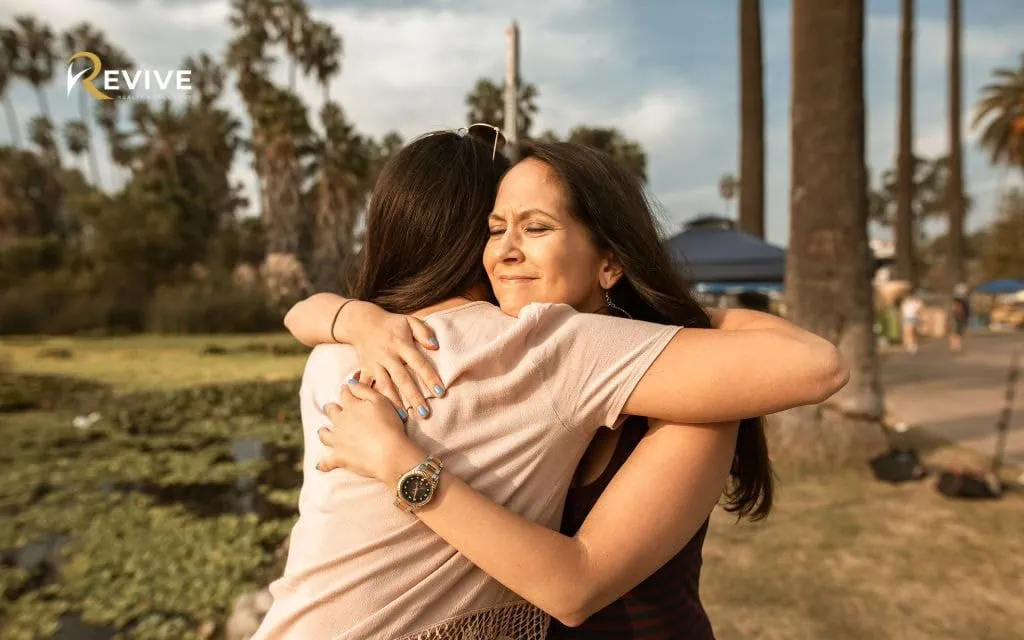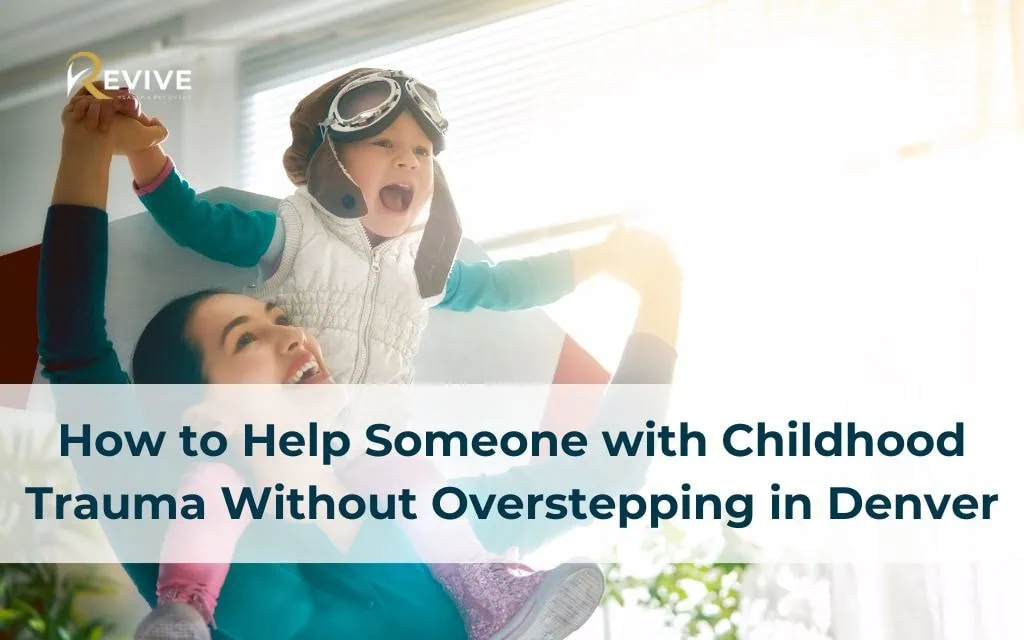When someone you care about is struggling with the effects of childhood trauma, knowing how to help can feel overwhelming. Learning how to help someone with childhood trauma requires patience, understanding, and access to the right resources – especially here in Colorado, where 55% of children experience at least one adverse childhood experience, higher than the national average.
As a Denver-based center specializing in trauma recovery, we’ve compiled this comprehensive guide to help you support your loved ones on their healing journey. Whether you’re a partner, family member, friend, or caregiver, these trauma-informed approaches can make a significant difference in someone’s recovery process.
If you’re seeking immediate guidance on how to help someone with childhood trauma, call Revive Health Recovery at (303) 268-4655 for 24/7 professional support.
Understanding Childhood Trauma and Its Impact
What Defines Childhood Trauma in 2025
Childhood trauma, as defined by the CDC as Adverse Childhood Experiences (ACEs), refers to frightening, dangerous, or violent events experienced before age 18 that threaten a child’s life or bodily integrity. These experiences can have lasting effects well into adulthood, especially when they occur during critical developmental periods.
Types of childhood trauma include:
- Physical abuse
- Sexual abuse
- Emotional abuse
- Neglect
- Witnessing domestic violence
- Community violence
- Natural disasters
- Medical trauma
- Refugee trauma
- Traumatic grief or separation
Here in Colorado, our unique geography and demographics create specific trauma contexts. The combination of urban centers like Denver with isolated mountain communities means trauma experiences—and access to help—can vary widely across the state.
The impact of childhood trauma is neurobiological as well as psychological. Trauma literally reshapes brain development, affecting the stress response system, emotion regulation, and even physical health outcomes later in life, as research from Harvard T.H. Chan School of Public Health shows. Understanding these biological impacts is crucial when learning how to help someone with childhood trauma.
Recognizing Signs of Unresolved Trauma in Adults
When supporting someone with childhood trauma, it’s important to recognize how these early experiences might manifest in adulthood:
- Emotional Regulation Challenges: Difficulty managing emotions, mood swings, or feeling emotionally numb
- Relationship Patterns: Trust issues, attachment disorders, trauma bonding, or difficulty maintaining healthy boundaries
- Physical Symptoms: Chronic pain, autoimmune conditions, digestive issues, or sleep disturbances
- Mental Health Concerns: Anxiety, depression, PTSD, complex PTSD, or dissociation
- Behavioral Indicators: Substance use issues, hypervigilance, avoidance behaviors, or risky decision-making

In Denver and the surrounding Colorado communities, these trauma responses can be influenced by our region’s specific challenges, including altitude effects on mental health, isolation in rural areas, and higher rates of substance use that often interconnect with trauma histories.
Wondering if your loved one’s behaviors might be related to childhood trauma? Reach out to our trauma specialists at Revive Health Recovery: (303) 268-4655.
Creating a Foundation for Supporting Trauma Recovery
Building Safety and Trust: The Colorado Approach
The foundation of helping someone with childhood trauma begins with creating safety – both physical and emotional. Colorado’s Trauma Informed System of Care (COACT) emphasizes five core principles that guide this approach: Truth, Equity, Collaboration, Community Informed Practice, and Generational Impact.
To build safety in your relationship with someone who has experienced trauma:
- Be consistent and predictable: Maintain routines and follow through on commitments
- Respect physical boundaries: Ask before initiating physical contact
- Create emotional safety: Avoid judgment, criticism, or dismissing feelings
- Practice transparency: Be honest and clear in your communication
- Offer choices: Trauma often involves a loss of control, so providing options helps restore agency
Colorado’s natural environment offers unique opportunities for creating safe spaces. Many Denver trauma-informed therapy programs incorporate outdoor experiences as part of healing, utilizing our state’s natural resources to foster psychological safety and grounding.
Understanding Trauma Triggers and Responses
Triggers are stimuli that remind someone of past trauma, often unconsciously, prompting an automatic stress response. In Colorado, common triggers might include:
- Weather events like severe thunderstorms or wildfires that can activate disaster-related trauma
- Altitude changes affecting anxiety and physiological arousal
- Seasonal isolation during heavy winter months
- Specific locations or environments that resemble traumatic settings
When someone is triggered, they may experience:
- Emotional flashbacks
- Dissociation or feeling “spaced out”
- Fight responses (anger, irritability)
- Flight responses (anxiety, panic, avoidance)
- Freeze responses (shutting down, feeling stuck)
- Fawn responses (people-pleasing, abandoning boundaries)
Knowing how to help someone with childhood trauma during a triggered state involves:
- Remaining calm and present
- Using a gentle, non-threatening tone
- Validating their experience without trying to “fix” it
- Offering support for nervous system regulation
- Not taking their reactions personally
Need guidance on handling a specific trauma trigger situation? Our trauma specialists are available 24/7: (303) 268-4655.

Practical Ways to Support Someone with Childhood Trauma
1. Communication Strategies That Promote Healing
Effective communication is essential when learning how to help someone with childhood trauma. Trauma-sensitive communication includes:
- Using “I” statements: “I notice” rather than “You always”
- Providing choices: “Would you prefer to talk now or later?” rather than demands
- Validating experiences: “That sounds really difficult” instead of minimizing
- Practicing patience: Allowing pauses and silence during difficult conversations
- Avoiding triggering language: Being mindful of words that might activate trauma memories
For Colorado residents, communication may need to account for our state’s diverse cultural contexts. Denver’s trauma recovery services often incorporate cultural competency for our region’s diverse populations, including Indigenous communities, immigrant groups, and various cultural backgrounds that may have different trauma expressions and healing pathways.
2. Daily Support Actions Anyone Can Provide
Supporting childhood trauma recovery Colorado doesn’t always require professional expertise. Here are practical actions anyone can take:
- Establish predictable routines: Consistency helps rebuild a sense of safety
- Support physical self-care: Encourage nutritious eating, adequate sleep, and movement
- Create calm environments: Reduce unnecessary stimulation in living spaces
- Offer grounding techniques: Share simple tools like the 5-4-3-2-1 sensory exercise
- Be present without pressure: Sometimes just sitting quietly together is helpful
- Respect boundaries: Honor “no” and requests for space
- Suggest resilience-building activities: Colorado offers many nature-based opportunities for mindfulness and connection
Remember that recovery isn’t linear. There will be good days and challenging days. Your consistent presence and support through both is invaluable to someone healing from childhood trauma.
For personalized guidance on supporting your loved one’s specific trauma recovery needs, contact Revive Health Recovery at contact@revivehealthrecovery.com or call (303) 268-4655.
Colorado Resources for Trauma Recovery
Professional Support Options in Denver
Denver has developed a robust network of trauma specialists near me Denver who offer evidence-based approaches to healing. Professional support options include:
- Individual therapy with trauma-informed therapists
- Group therapy focused on specific trauma types or populations
- Specialized treatments like EMDR therapy (Eye Movement Desensitization and Reprocessing)
- Trauma-Focused Cognitive Behavioral Therapy (TF-CBT)
- Somatic experiencing and body-centered approaches
- Art therapy and expressive modalities
- Medication management when appropriate
Many Colorado providers offer telehealth options, making trauma recovery services Denver accessible even for those in remote mountain communities or those who find in-person sessions initially overwhelming.
When seeking professional support, insurance coverage can vary widely. Rather than providing specific costs that fluctuate, we recommend contacting Revive Health Recovery directly at (303) 268-4655 to discuss your specific insurance and financial situation.
Community-Based Support Programs
Beyond clinical treatment, Colorado offers numerous community resources for childhood trauma support Colorado:
- Support groups through organizations like The Center for Trauma & Resilience Denver
- Peer support networks connecting survivors with others who understand
- Educational workshops on trauma recovery and resilience building
- Family support programs through ChildSafe Colorado and the Denver Child Advocacy Center
- Crisis intervention via Colorado Crisis Services (1-844-493-8255)
- Advocacy services through Illuminate Colorado and similar organizations
Colorado’s unique blend of urban and rural communities creates both challenges and opportunities for trauma support. While Denver offers concentrated resources, rural areas may require creative approaches to access care. Revive Health Recovery works to bridge these gaps for clients throughout the state.
Looking for specific community resources near you? Our team can help connect you: (303) 268-4655.
When and How to Encourage Professional Help
Recognizing When Specialized Support Is Needed
While personal support is invaluable, knowing when to encourage professional help for childhood trauma recovery Colorado is equally important. Consider seeking specialized care when someone:
- Expresses thoughts of self-harm or suicide
- Shows significant functional impairment in daily life
- Experiences intense, overwhelming emotions that don’t improve
- Uses substances to cope with trauma symptoms
- Has nightmares, flashbacks, or intrusive memories that disrupt life
- Experiences physical symptoms that don’t have clear medical causes
- Shows signs of dissociation or lost time
- Has relationship difficulties across multiple contexts
Starting the conversation about professional help requires sensitivity. Instead of suggesting something is “wrong,” frame it as adding tools to their support system. For example: “I’ve noticed you’ve been having trouble sleeping lately. Would you be open to talking with someone who specializes in helping with that?”
Colorado’s Trauma Treatment Approaches
Colorado has emerged as a leader in innovative trauma healing Denver approaches, including:
- Adventure therapy utilizing Colorado’s natural landscapes
- Animal-assisted interventions that leverage the human-animal bond
- Mindfulness-based trauma recovery programs
- Neurofeedback and biofeedback technologies
- Therapeutic psychedelics (following Colorado’s pioneering legislation)
Our state’s trauma specialists often integrate these modalities with evidence-based practices like trauma-focused cognitive behavioral therapy Denver to create comprehensive healing plans tailored to individual needs.
Denver Health has implemented specific trauma-informed medical screening protocols recognized nationally as innovative, allowing for better integration between physical and mental healthcare for trauma survivors.
To learn more about trauma treatment options that might be right for your loved one, call Revive Health Recovery at (303) 268-4655.
Supporting Yourself While Supporting Others
Managing Secondary Trauma and Caregiver Fatigue
Learning how to love someone with childhood trauma must include caring for your own wellbeing. Supporting trauma survivors can lead to secondary trauma or compassion fatigue—the emotional and physical exhaustion from caring for others in distress.
Signs you may be experiencing caregiver fatigue include:
- Feeling emotionally drained or numb
- Changes in sleep or appetite
- Increased irritability or anxiety
- Difficulty concentrating
- Loss of satisfaction in activities you usually enjoy
- Physical symptoms like headaches or tension
Self-care strategies for supporters include:
- Setting and maintaining healthy boundaries
- Seeking your own support through therapy or support groups
- Practicing regular self-care activities
- Taking breaks and respecting your limits
- Connecting with others who understand your experience
For more information on supporting caregivers, see the National Child Traumatic Stress Network’s resources.
Building Your Support Network in Colorado
You don’t have to navigate supporting someone with trauma alone. Colorado offers resources specifically for caregivers and supporters:
- Support groups for partners and family members of trauma survivors
- Educational resources through WellPower (formerly Mental Health Center of Denver)
- Online communities connecting supporters across Colorado’s diverse geography
- Respite care options to provide needed breaks
- Therapy services focused on secondary trauma and relationship dynamics
Remember that supporting your own wellbeing is not selfish—it’s necessary for sustainable support of your loved one’s healing journey.
Need support for yourself as you help someone with trauma? Reach out to us at (303) 268-4655.

Creating Trauma-Informed Environments
Principles of Trauma-Informed Care in Colorado Settings
Creating environments that support healing extends beyond individual interactions. Colorado’s Trauma Informed System of Care principles can be applied in homes, workplaces, and community settings:
- Truth: Acknowledge the reality and impact of trauma
- Equity: Recognize how trauma affects different populations uniquely
- Collaboration: Include trauma survivors in decision-making processes
- Community Informed Practice: Consider cultural and contextual factors
- Generational Impact: Address trauma’s effects across generations
Implementing these principles might involve:
- Redesigning physical spaces to feel safe and welcoming
- Establishing clear, consistent expectations and boundaries
- Creating opportunities for choice and control
- Providing access to calming activities and spaces
- Training community members in basic trauma awareness
Advocating for Better Trauma Support in Your Community
As you learn how to help someone with childhood trauma, consider how you might extend that support to broader advocacy:
- Supporting trauma-informed policy initiatives in Colorado
- Participating in community education events about childhood trauma
- Sharing resources with schools, workplaces, and community organizations
- Volunteering with organizations like ChildSafe Colorado or the Tennyson Center for Children
- Promoting destigmatization of trauma recovery and mental health support
Colorado has pioneered community-based trauma response systems following local traumatic events, creating models that other states now follow. By participating in these efforts, you contribute to creating safer, more supportive communities for all trauma survivors.
Interested in trauma advocacy resources or training? Contact us at contact@revivehealthrecovery.com.
FAQs About How To Help Someone With Childhood Trauma
Can you fully recover from childhood trauma?
Yes, recovery from childhood trauma is absolutely possible, though the journey looks different for everyone. Complete healing doesn’t mean erasing memories, but rather developing a new relationship with them where they no longer control your life. With the right support and trauma-informed care, people can not only recover but experience post-traumatic growth. At Revive Health Recovery, we’ve witnessed remarkable healing journeys and provide comprehensive care tailored to each individual’s needs and timeline. Call us at (303) 268-4655 to learn more about our trauma recovery programs.
What should you not say to someone with childhood trauma?
Avoid minimizing statements like “It’s in the past” or “Just get over it,” comparisons like “Others have it worse,” or phrases that question their experience such as “Are you sure that happened?” These can be deeply invalidating. Also avoid pressuring them to forgive abusers or pushing them to share details before they’re ready. Instead, focus on validating language that acknowledges their experience and strength. Revive Health Recovery offers guidance for supporters on trauma-sensitive communication—call us at (303) 268-4655 for personalized advice.
How do I help someone who is having a trauma response or flashback?
During a flashback or trauma response, remain calm and speak in a gentle, even tone. Remind them they’re safe and in the present moment. Avoid sudden movements or touching without permission. Offer grounding techniques like naming five things they can see or feel. Don’t try to reason them out of their experience—validate it instead. After they’ve stabilized, encourage them to use their support systems. Revive Health Recovery provides crisis support and can help develop personalized grounding plans—reach out to us 24/7 at (303) 268-4655.
How much does trauma therapy typically cost in Colorado?
Trauma therapy costs in Colorado vary based on the provider’s expertise, treatment approach, session length, and whether insurance is accepted. While we can’t list specific prices as they fluctuate, know that many insurance plans cover trauma therapy, and Revive Health Recovery works with numerous insurance providers. We also offer different program options to accommodate various financial situations. For personalized information about costs, insurance coverage, and payment options, please contact our team directly at (303) 268-4655.
What are the best trauma-informed therapy options in Denver?
Denver offers several evidence-based trauma therapy approaches, including EMDR (Eye Movement Desensitization and Reprocessing), Trauma-Focused Cognitive Behavioral Therapy (TF-CBT), Somatic Experiencing, and Internal Family Systems. For complex childhood trauma, longer-term approaches that address attachment and developmental impacts are often beneficial. Revive Health Recovery incorporates these proven modalities while also leveraging Colorado’s natural resources and innovative treatments only available in our state. Our comprehensive assessment process helps determine the best approach for each individual’s unique needs—call us at (303) 268-4655 to learn more.
5 Reasons to Choose Revive Health Recovery for Trauma Support
When seeking help with how to help someone with childhood trauma in the Denver area, Revive Health Recovery stands out as a leader in trauma-informed care. Here’s why:
1. Specialized Trauma Expertise
Our team of trauma specialists has extensive training in cutting-edge approaches specifically designed for childhood trauma recovery. We understand the complex neurobiology of trauma and how it manifests differently in each person’s life.
2. Comprehensive, Holistic Approach
We treat the whole person, not just trauma symptoms. Our programs integrate mental health care with physical wellness, relational healing, and practical life skills development—all essential components of lasting trauma recovery.
3. Colorado-Specific Trauma Understanding
As a Denver-based center, we understand the unique challenges and opportunities for trauma healing in Colorado’s diverse communities. Our treatments incorporate local resources and address region-specific trauma factors.
4. Individualized Treatment Planning
We recognize that each person’s trauma experience is unique. Our thorough assessment process ensures treatment is tailored to individual needs, preferences, and goals rather than applying a one-size-fits-all approach.
5. Supportive Community Environment
At Revive Health Recovery, healing happens in community. We foster connection among clients while also providing education and support for the important people in their lives – because we know that learning how to help someone with childhood trauma is a crucial part of the recovery process.
Located conveniently at 1427 S Federal Blvd, Denver, CO 80219, Our Denver Trauma Treatment Center Revive Health Recovery is ready to support you and your loved one on the journey toward healing from childhood trauma. Our team is available 24/7 to answer questions and guide you toward the right resources.
Ready to take the next step in supporting childhood trauma recovery? Contact us at contact@revivehealthrecovery.com or call (303) 268-4655 today.



